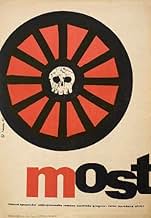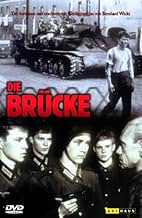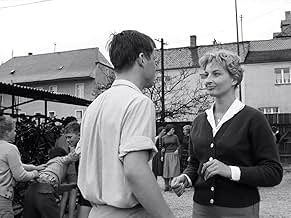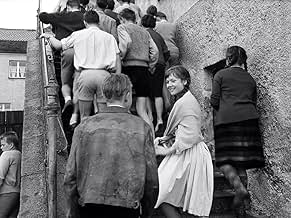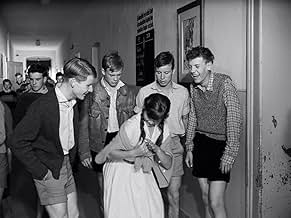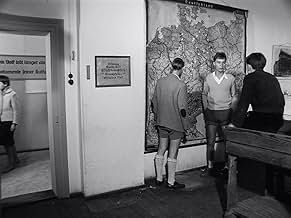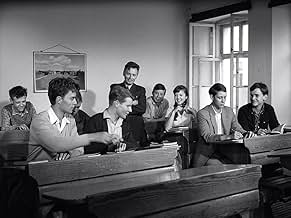NOTE IMDb
7,9/10
9,1 k
MA NOTE
Ajouter une intrigue dans votre langueIn 1945, Germany is being overrun, and nobody is left to fight but teenagers.In 1945, Germany is being overrun, and nobody is left to fight but teenagers.In 1945, Germany is being overrun, and nobody is left to fight but teenagers.
- Réalisation
- Scénario
- Casting principal
- Nommé pour 1 Oscar
- 16 victoires et 1 nomination au total
Volker Bohnet
- Hans Scholten
- (as Folker Bohnet)
Günter Hoffmann
- Sigi Bernhard
- (as Günther Hoffmann)
Avis à la une
We were shown this movie at school, so I always remembered it as a politically correct piece educational film - which it is, in a way. This is film with a clear purpose. It wants you to learn something. The amazing thing is that it is also a good film. Its message "War Is Bad" is brought across not so much by showing blood, death and destruction but by the means of classical tragedy: There are no "bad guys" in this film; on the contrary, most people try to do good, be humane. (E.g. the boys are told to guard the bridge in order to keep them away from the front.) But what they do results in disaster, because the evil is war itself.
Die Brücke was on Dutch or Belgian TV some 20 years ago, when I saw it. Like many others I was deeply impressed. There has been criticism on acting and directing. This criticism is correct. But it does not matter. What counts is the script. Only seldom I have seen a movie with a better script. Here a modified quote from The Good, the Bad and the Ugly applies: never seen wasted young lives so badly. With a fairly simple story Die Brücke makes mercilessly clear what war and National-Socialism is. I can understand, why nobody has the courage to do a remake. Perfection might lead to a lesser impact in this case. One can argue, that Paths of Glory and Hamburger Hill are better. Not a bad word about these two, but Die Brücke is emotionally the most gripping.
I lived through that time, I was seventeen, and I know fourteen year olds were fighting to the last " boy ". The realism of this film still takes me back to '45. It happened that way.
Made in 1959, "The Bridge" is one of the few films from the former West Germany that squarely faces the theme of Nazi defeat. It is a courageous work where content is all important, so much so that it hardly matters that the direction is rather limp and pedestrian and the acting somewhat less than impressive. It is an elegy to lost youth concluding with a caption that vents such anger through the irony of understatement that it earns without question a rightful place among the most seriously committed of anti-war films. The setting is an unspecified small town in Germany where to begin with, apart from a bomb dropped in the river and conversations about hardship and shortages, the war seems far more than a distant rumble away. We follow a group of seven 15 year old boys at school and play until the time when the rapidly approaching American front necessitates their call up and hasty military training. As the military front creeps ever closer they are given the role of defending a bridge over a river, the wisdom of which is seriously questioned by several of their superior offices but which they eagerly take on in the spirit of boyhood heroism combined with what one can well imagine to be the ideology instilled into them by past experience of the Hitler Youth. The terrible last half hour in which their baptism by fire is recorded in graphic detail through the stages of excitement, terror and death is gruelling to watch, the more so because the youth of the sufferers generates so much anger at such waste and loss. I would not for one moment claim the "The Bridge" is in the same league as Kubrick's "Paths of Glory", Helma Sanders-Brahms's "Germany, Pale Mother" or Klimov's "Come and See" - Bernhard Wicki is a lesser director who never quite succeeds in making each of the seven protagonists a memorable character - but nevertheless he manages convincingly to flesh out in dramatic form the terrible reality behind that awesome newsreel footage of Hitler encouraging boy troops amid the rubble of Berlin. "The Bridge" brings home more than most films the madness of it all.
German war drama from Deutsche Film Hansa and director Bernhard Wicki. In the waning days of WW2, a group of German high school friends all get drafted into the army, much to their excitement. However, with literally only a single day's worth of training, they are sent to their hometown to guard a small bridge until it can be destroyed by a demolition crew. The young men take their task very seriously, leading to tragic results
The 100 minutes film spends the first hour establishing the characters of each of the young men, so that the frenetic last act becomes even more devastating, as these are fully fleshed out individuals instead of the too-frequent ciphers and cliches found in many war films. The tone is distinctly anti-war, but the movie is never preachy, and the futility of their actions is made apparent naturally, without contrivance. The filmmaking in the final stretch of the film is ahead of its time in the use of rapid edits, traveling camera shots, and zooms. The movie was nominated for the Best Foreign Language Film Oscar (it lost to Black Orpheus). Recommended.
The 100 minutes film spends the first hour establishing the characters of each of the young men, so that the frenetic last act becomes even more devastating, as these are fully fleshed out individuals instead of the too-frequent ciphers and cliches found in many war films. The tone is distinctly anti-war, but the movie is never preachy, and the futility of their actions is made apparent naturally, without contrivance. The filmmaking in the final stretch of the film is ahead of its time in the use of rapid edits, traveling camera shots, and zooms. The movie was nominated for the Best Foreign Language Film Oscar (it lost to Black Orpheus). Recommended.
Le saviez-vous
- AnecdotesThe end credits suggest that the story relates to true events which supposedly happened on "April 27, 1945", but this specific story is fictitious, while the general use of teenage boys as soldiers in the last days of the Third Reich is accurate.
- GaffesWhen the boys are assembled at night, they are told they will be part of the 336th Division. That unit was destroyed and surrendered to the Soviets on the Eastern Front nearly a year earlier in 1944 and was never reformed.
- Citations
Sigi Bernhard: Whoever defends one square foot of German soil defends Germany!
- Versions alternativesAn English dubbed version was released in the USA in 1963.
- ConnexionsEdited into Bernhard Victor Christoph Carl von Bülow genannt Loriot (2008)
Meilleurs choix
Connectez-vous pour évaluer et suivre la liste de favoris afin de recevoir des recommandations personnalisées
- How long is The Bridge?Alimenté par Alexa
- Are you sure this movie is from 1959? According to end credits, it's from 1969.
- Why is this movie titled Die Brucke? From my high school German Der is male, Die is female and Das is for all other words. The Bridge is not female. It should be Das Brucke.
Détails
- Durée1 heure 43 minutes
- Couleur
- Mixage
Contribuer à cette page
Suggérer une modification ou ajouter du contenu manquant


